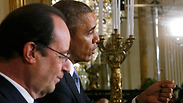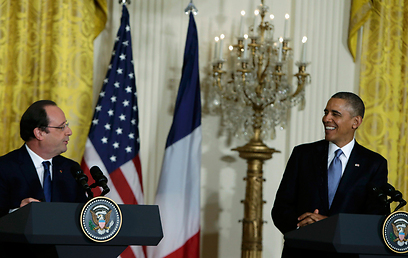
Russia and West row over Syria aid resolution as Moscow threatens veto
Obama and Hollande present united front in row, as Russia says draft paves way for military intervention
A row has broken out between Russia and the West over the latest draft of a United Nations resolution on aid access in Syria, with the leaders from both sides weighing in on the issue.
The resolution, which expresses the UN Security Council's intention to impose sanctions if the Syrian government does not allow unrestricted aid deliveries to civilians caught in the fighting, was circulated among the 15 council members.
RIA news agency quoted Russian Deputy Foreign Minister Gennady Gatilov as saying on Wednesday that Moscow believes the draft is aimed at creating grounds for military intervention in Syria, and would veto the document in its current form.
"It is unacceptable to us in the form in which it is now being prepared, and we, of course, will not let it through," Gatilov was quoted as saying of the Western-Arab draft that was debated in the UN Security Council on Tuesday.
Meanwhile, Western powers pushed forward Tuesday with the resolution threatening sanctions against Syria despite Russia's veto threat, with President Barack Obama sharply criticizing Moscow's opposition to the measure, which would help millions in desperate need of humanitarian aid.
Western countries made clear they had no intention of dropping the proposal despite Russia's vow to block it a day earlier.
Obama, speaking at a joint news conference in Washington with French President Francois Hollande, said there is "great unanimity among most of the Security Council" in favor of the resolution and "Russia is a holdout."
The president said his secretary of state, John Kerry, and others have "delivered a very direct message" pressuring the Russians to drop their opposition. He said "it is not just the Syrians that are responsible" for the plight of civilians but "the Russians, as well, if they are blocking this kind of resolution."
Hollande made clear France was determined to move forward with the resolution.
"How you can object to humanitarian corridors? Why would you prevent the vote of a resolution if, in good faith, it is all about saving human lives?" he said.
In Moscow, Russian Foreign Minister Sergey Lavrov said the text is a "one-sided" effort to blame the Syrian government, which Moscow supports, for holding up aid.
Still, Russian Ambassador Vitaly Churkin attended a Security Council meeting Tuesday to discuss the text and told reporters later that it was "a good exchange of the challenges of the humanitarian situation in Syria."
A day earlier, both Churkin and China's ambassador were no-shows at a meeting with supporters of the draft resolution, and the Russian ambassador made clear his country would veto it if it were put to a vote. China sent its deputy ambassador to Tuesday's meeting.
Russia and China have blocked three previous Western-backed resolutions that would have pressured Syrian President Bashar Assad to end the now three-year-old civil war.
The divided Security Council did come together in October to approve a presidential statement appealing for immediate access to all areas of Syria to deliver aid. Western and Arab countries want to go a step further with a legally binding resolution.
Pressure mounted on Russia and China to consider the proposal, with UN spokesman Martin Nesirky saying UN Secretary-General Ban Ki-moon and humanitarian chief Valerie Amos support the measure. Nesirky, however, said it was up to the Security Council to decide.
France's UN Ambassador, Gerard Araud, said the text - which calls for pauses to allow humanitarian access and an end to sieges - is "very simple, not political. It's balanced. There is no reason to oppose it."
"We are facing the worst humanitarian tragedy since the genocide in Rwanda in 1994," Araud said. "Starvation is used as a weapon by the regime, and the regime is bombing in an indiscriminate way the city of Aleppo."
"I think we should move quickly," he added.











